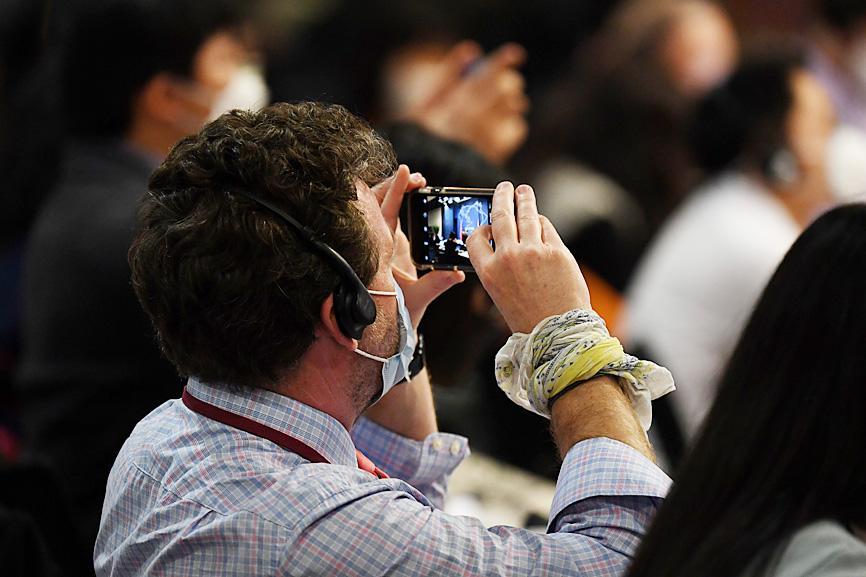Authorities in Beijing have forced at least seven Chinese nationals to stop working for US news outlets in the city, according to the Committee to Protect Journalists, the latest development in an ongoing dispute between the US and China over media access.
Members of the New York Times, Voice of America and two other outlets were dismissed from their jobs on Thursday and Friday, the group said, identifying only the newspaper and the US Congress-funded broadcaster.
China on Tuesday expelled more than a dozen American journalists working for the Times, the Wall Street Journal (WSJ) and the Washington Post in response to a cap being placed on how many Chinese journalists are allowed to be stationed in the US.

Photo: AFP
The tit-for-tat exemplifies how fraught US-China ties have become despite the signing of a phase-one trade deal in January and calls for more global cooperation to contain COVID-19.
In addition to media, the countries have also feuded over the use of “Chinese virus” by US officials to describe the outbreak and an assertion by a Chinese official that the US military spread the virus.
Foreign news outlets in China are barred from directly employing Chinese nationals.
They are instead employed through the Beijing Personnel Service Corp for Diplomatic Missions, which is affiliated with the Chinese Ministry of Foreign Affairs.
It was this agency that dismissed members of US media in the past few days, the Washington-based committee said.
When asked on Thursday at the ministry’s daily press briefing if the local employees of US outlets had been told their work credentials were being revoked, spokesman Geng Shuang (耿爽) said relevant authorities manage the employees of foreign media in accordance with laws and regulations.
The ministry on Tuesday also ordered the Times, the WSJ, the Post, Voice of America and Time magazine to submit written declarations about their staff, operations, finances and real estate in China.
That was in retaliation for the US last month ordering five Chinese state-owned media to be classified as “foreign missions.”
In response to a request for comment, a spokesperson for Voice of America confirmed the committee’s statement while declining further comment.
A spokesperson for the Post referred to an earlier statement by executive editor Martin Baron condemning the expulsion of reporters.
Time editor-in-chief Edward Felsenthal, in a statement provided by a spokesperson, said the outlet opposed the expulsion and intimidation of journalists.
A WSJ spokesperson declined to comment while the Times did not immediately respond to queries.
A spokesperson for Bloomberg, which has news bureaus in Beijing and Shanghai, also declined to comment.

The US government has signed defense cooperation agreements with Japan and the Philippines to boost the deterrence capabilities of countries in the first island chain, a report by the National Security Bureau (NSB) showed. The main countries on the first island chain include the two nations and Taiwan. The bureau is to present the report at a meeting of the legislature’s Foreign Affairs and National Defense Committee tomorrow. The US military has deployed Typhon missile systems to Japan’s Yamaguchi Prefecture and Zambales province in the Philippines during their joint military exercises. It has also installed NMESIS anti-ship systems in Japan’s Okinawa

‘WIN-WIN’: The Philippines, and central and eastern European countries are important potential drone cooperation partners, Minister of Foreign Affairs Lin Chia-lung said Minister of Foreign Affairs Lin Chia-lung (林佳龍) in an interview published yesterday confirmed that there are joint ventures between Taiwan and Poland in the drone industry. Lin made the remark in an exclusive interview with the Chinese-language Liberty Times (the Taipei Times’ sister paper). The government-backed Taiwan Excellence Drone International Business Opportunities Alliance and the Polish Chamber of Unmanned Systems on Wednesday last week signed a memorandum of understanding in Poland to develop a “non-China” supply chain for drones and work together on key technologies. Asked if Taiwan prioritized Poland among central and eastern European countries in drone collaboration, Lin

BACK TO WORK? Prosecutors said they are considering filing an appeal, while the Hsinchu City Government said it has applied for Ann Kao’s reinstatement as mayor The High Court yesterday found suspended Hsinchu mayor Ann Kao (高虹安) not guilty of embezzling assistant fees, reducing her sentence to six months in prison commutable to a fine from seven years and four months. The verdict acquitted Kao of the corruption charge, but found her guilty of causing a public official to commit document forgery. The High Prosecutors’ Office said it is reviewing the ruling and considering whether to file an appeal. The Taipei District Court in July last year sentenced Kao to seven years and four months in prison, along with a four-year deprivation of civil rights, for contravening the Anti-Corruption

NO CONFIDENCE MOTION? The premier said that being toppled by the legislature for defending the Constitution would be a democratic badge of honor for him Premier Cho Jung-tai (卓榮泰) yesterday announced that the Cabinet would not countersign the amendments to the local revenue-sharing law passed by the Legislative Yuan last month. Cho said the decision not to countersign the amendments to the Act Governing the Allocation of Government Revenues and Expenditures (財政收支劃分法) was made in accordance with the Constitution. “The decision aims to safeguard our Constitution,” he said. The Constitution stipulates the president shall, in accordance with law, promulgate laws and issue mandates with the countersignature of the head of the Executive Yuan, or with the countersignatures of both the head of the Executive Yuan and ministers or